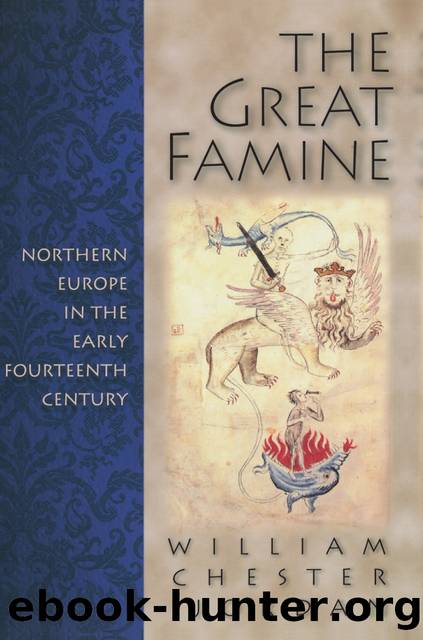The Great Famine by William Chester Jordan

Author:William Chester Jordan
Language: eng
Format: epub
Publisher: Princeton University Press
Published: 1996-06-15T00:00:00+00:00
England
Already in 1315 the English under Edward II attempted by parliamentary action to impose price controls on livestock. There has been some hesitation among historians to consider this action a response to the Great Famine, since England would not see the first bad harvest associated with the famine before June; and prices could not really respond to that harvest until its true extent was widely known.25 An alternative explanation, suggested by Mavis Mate, focuses on the money supply as a factor driving up prices and provoking the controls.26 But no such explanation needs to be invoked, for we have already considered persuasive English evidence that the extremely bad rains started there in late 1314.27 We also know that the usual winter rains were punctuated by periods of extraordinary cold. All this was followed by the renewal of drenching spring rains in 1315. Given these conditions, the first indicator of a subsistence crisis would have been a decline in herd and flock size from poor lambing and from diseases and infestations like liverfluke.28 Though almost certainly not on the scale of the great murrains later in the famine, this decline would still have forced prices up considerably in London where the crownâs focus of attention was riveted. Consequentlyâand this is decisive in the argumentâthe price controls were imposed not on grain or grain products in early 1315, but, as indicated, on livestock.
Because of the rapidly increasing magnitude of the shortages and the spiraling cost of fodder crops, the controls, for those who could benefit from the high prices, were worth getting around and proved unsuccessful. But although they were rescinded, the policy was reimposed and refocused after the harvests repeatedly failed. This time the controls were placed on products, like ale, that were manufactured from grain. The action on ale, in January 1317, reinforced that taken by the city of London in September of the year before.29 Aggressive as the authorities were, however, no historian has argued that these price controls enjoyed any serious success.
The likely failure of price controls did not mean in England, anymore than in France, that the crown was willing to see prices artificially inflated by hoarders and speculators beyond the levels induced by the harvest shortfalls per se. Moreover, action against local speculation was a far easier policy to put into practice than were price controls; and it was far more popular, supported as it was by widely shared notions of the just price.30 Consequently, speculation encouraged âdraconian measuresâ on the part of the political authorities.31
In letters to various bishops in April 1316 the English king addressed the problem. Acknowledging that the horrors of bad weather and the poor harvests had been brought on his kingdom because of sinful humanityâs disobedience, and âdesiring therefore to provide for the salvation of our people by the ways and means that we can,â Edward II urged the clergy to exhort the hoarders âwith efficacious wordsâ to offer their surplus grain for sale. They were to use other methods, presumably
Download
This site does not store any files on its server. We only index and link to content provided by other sites. Please contact the content providers to delete copyright contents if any and email us, we'll remove relevant links or contents immediately.
| General | Channel Islands |
| England | Northern Ireland |
| Scotland | Wales |
Room 212 by Kate Stewart(4134)
The Crown by Robert Lacey(4126)
Endurance: Shackleton's Incredible Voyage by Alfred Lansing(3873)
The Iron Duke by The Iron Duke(3664)
The Rape of Nanking by Iris Chang(3541)
Killing England by Bill O'Reilly(3474)
Joan of Arc by Mary Gordon(3281)
Say Nothing by Patrick Radden Keefe(3088)
I'll Give You the Sun by Jandy Nelson(2857)
Shadow of Night by Deborah Harkness(2763)
Hitler's Monsters by Eric Kurlander(2749)
Margaret Thatcher: The Autobiography by Thatcher Margaret(2698)
Mary, Queen of Scots, and the Murder of Lord Darnley by Alison Weir(2689)
Darkest Hour by Anthony McCarten(2663)
Blood and Sand by Alex Von Tunzelmann(2620)
Red Famine: Stalin's War on Ukraine by Anne Applebaum(2481)
Eleanor & Park by Rainbow Rowell(2409)
The One Memory of Flora Banks by Emily Barr(2365)
Book of Life by Deborah Harkness(2296)
